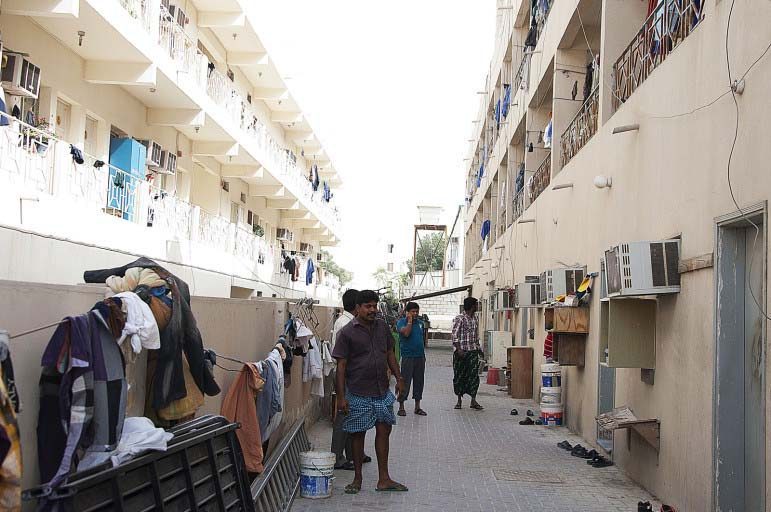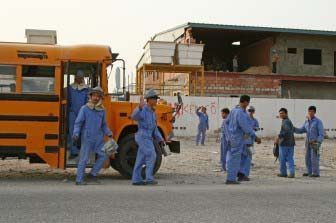
By importing a huge labor force from poor countries, Qatar is actually doing more to help counter global inequality than its well-off peers, a pair of American academics has argued.
Offering a contrarian perspective on Qatar’s migration policies in an essay recently published in New Republic, Eric Posner and Glen Weyl – both University of Chicago professors – say this country’s high use of foreign labor is helping to raise income levels in some of the world’s poorest countries.
They point out that low-income laborers from Bangladesh, India and elsewhere make significantly more money working in the Gulf than they would in their home countries, and most of their earnings are sent back home. This enables their family members to acquire basic services such as health care and education.
“By welcoming migrant workers, the UAE and its neighbor Qatar do more than any other rich country to reduce global inequality,” they said.
Qatar has one of the largest migrant workforces, relative to the number of nationals, in the world. Tens of thousands of new migrants take up residence in the country each month, driven in large part by the need for laborers to construct the vast amount of infrastructure needed for the 2022 World Cup.
The professors further argue that – while not palatable to human rights groups – the many restrictions blue-collar workers face here and in the rest of the Gulf are needed to reassure locals skeptical about importing such a big foreign workforce.
“Reducing inequality will require uncomfortable tradeoffs. Qatar would not welcome so many migrant workers if it had to give them generous political and civil rights …
The many unappealing aspects of the system – the migrants’ limited economic, political, and social rights, their segregation from the citizenry, and an authoritarian enforcement regime – seem necessary to maintain political support for the migration policies that help to reduce global inequality.”
Scrutinizing the tradeoffs

While Posner and Weyl argue that limiting the rights of foreign workers is needed for the system to work for Gulf governments, other researchers have said restrictions leave low-income laborers vulnerable to exploitation and thus unable to accumulate the wealth that they set out to earn.
In his 2012 paper, “Why Do They Keep Coming? Labor Migrants in the Gulf States” (registration required), former Qatar University assistant professor Andrew Gardner argued that the popular narrative of foreign workers yielding a certain portion of their rights in order to secure economic opportunities breaks down under scrutiny.
“I have repeatedly encountered men and women for whom a sojourn in the Gulf states has been a financial catastrophe: by entering into an agreement to travel to the Gulf, these men and women enter into a system that is fully capable of separating them from the tiny fortunes they and their families have invested in sending them to the Gulf in the first place,” wrote Gardner, who is currently an associate professor at the University of Puget Sound.
Migrants and their families must frequently borrow money to pay fees charged by recruitment companies in their home countries.
Compounding the problem is that roughly 20 percent of foreign workers are promised a salary that’s higher than what’s stated in the contract they’re presented upon arrival, according to a separate 2013 study by several Qatar University researchers and other academics titled, “A Portrait of Low-Income Migrants in Contemporary Qatar.”

Still, those authors found that workers whose contracts had been “switched” were only marginally less satisfied with their roles than those who were unaffected, suggesting that the changes were not always seen as a big issue by the affected workers.
The researchers, who interviewed nearly 1,200 low-income expats in early 2012, found they were paid a median monthly salary of QR1,000 (US$274) and sent home an average of QR764 (US$209) each month.
Those remittances add up to be a major source of income for many expats’ receiving countries, totaling some QR40.55 billion ($11.14 billion) last year, according to the Qatar Central Bank.
Fighting inequality, Gulf style
Posner and Weyl acknowledge that the income gap within Gulf states is among the largest in the world, with nationals earning many times the average salary of foreign laborers.

Nevertheless, the volume of migrants who have traveled to the Gulf in pursuit of economic opportunities means these countries have helped make a greater dent in global income inequality than most rich countries, they argue.
The researchers compare the Gulf nations’ impact to efforts made by members of the Organization for Economic Cooperation and Development, a group of 34 of the world’s richest countries.
They argue that wealthier nations try to reduce income inequality primarily through foreign aid and domestic policies, such as minimum wages and tax systems that effectively redistribute wealth.
“We citizens of OECD countries take pride in our political and civil rights, and our generous welfare systems. Yet we maintain our high standard of living by giving no rights and trivial money to people who live outside our arbitrary borders. While we fuss over whether we should raise or lower our marginal tax rates, we ignore the plight of the most desperate people in the world.”
While Posner and Weyl discuss how wealthier countries could dramatically help the world’s poorer citizens by adopting more liberal immigration policies, they stop short of advocating that other nations should import immigration policies from the Gulf:
“The GCC model of accepting migrants on economically and politically subordinate terms, though not humanitarian on its face, has proven so in practice. If this model were adopted in rich countries, then inequality – both political and economic – would dramatically increase within our own societies. This could undermine some of the liberal character we all prize, and it would certainly make all of us even more uncomfortable about inequality than we already are. But the benefits for the world’s poorest people would be vast.”
Thoughts?







